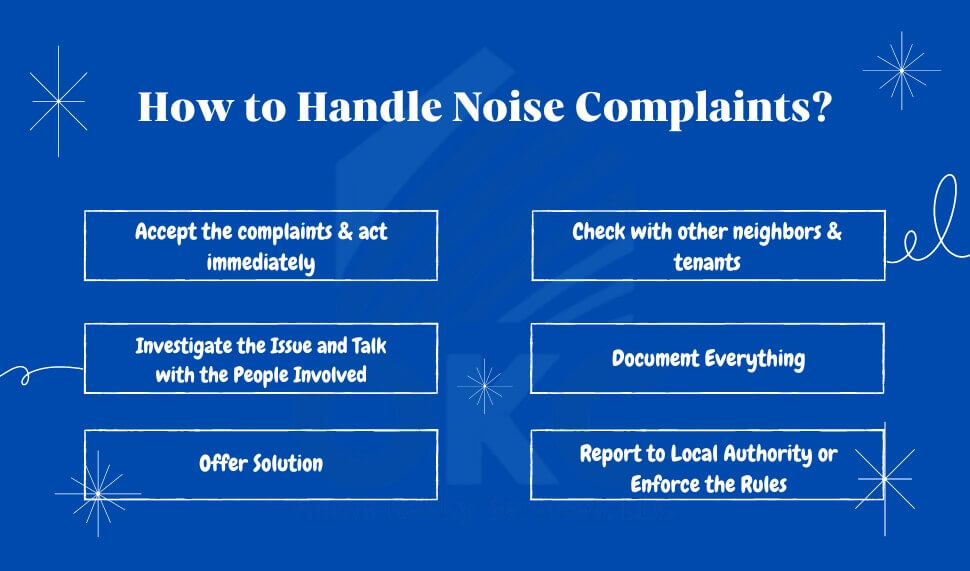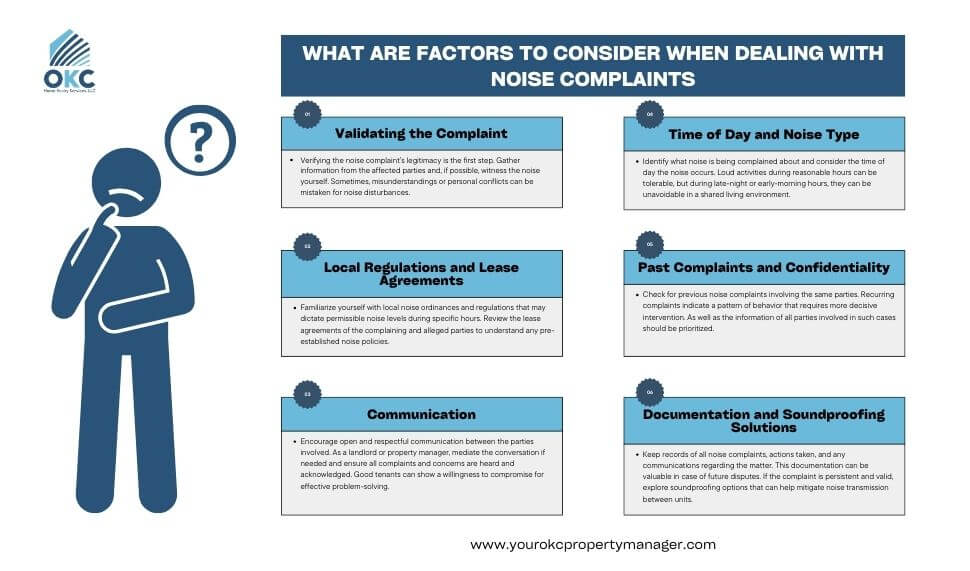Annoyed by noise complaints in your rental property? You’re not alone about it. Noise complaints are common in every property, but there are different ways to resolve them. So, discover a series of strategies to deal with noise complaints effectively and respectfully.
As a landlord, dealing with noise complaints can be a challenging and frustrating experience. Noisy tenants are those who create excessive noise and disturb the peace and quiet of others who lives in the same building or community. If you are a landlord and you have noisy renters then you might have already received complaints from your neighbors or other renters. In this article, we’ll talk about how to deal with noise complaints and noisy tenants.
Maximize Your Rental Income with Hassle-Free Property Management
Request a Service →Understanding the Impact of Noise Complaints
Before getting into the strategies for resolving noise complaints, it’s important to understand the impact of excessive and disturbing noise on neighbors and the entire community. Recognizing the seriousness of noise complaints is the first step toward addressing them effectively and respectfully. Disruptive noises not only deteriorates the peace and relationship of a neighborhood but can also lead to different consequences, such as:
Sleep Disturbances: The noise is not pleasant to our ears and directly sends disturbance signals to the brain affecting our sleep patterns. This leads to fatigue, irritability, and potential health issues.
Stress and Anxiety: Prolonged exposure to loud noises can increase stress levels and anxiety among affected residents.
Decreased Quality of Life: Persistent noise disturbances can decrease the overall quality of life of community members.
Strained Neighborly Relations: Relationships with neighbors are precious in our hard times. So frequent noise complaints can destroy good relationships with them, causing tension and conflict.
Recommended: For more details on neighbor interactions, see can neighbors complain about daytime noise.
Common Sources of Noise Complaints
After understanding the impact of excessive noise, now wondering, “what are the common sources of noise complaints?” No need to fret. Here are some common sources of noise complaints that can arise in rental properties:
- Loud Music and Parties: High volumes from music or social gatherings can significantly disturb neighbors, particularly during late-night hours.
- Heavy Foot Traffic: Noise from footsteps, particularly in multi-story buildings, can be disruptive to tenants living below.
- Pets: Noisy pets, such as barking dogs, can lead to disturbances, especially in close living environments.
- Appliances and Equipment: Noisy appliances like washing machines, dishwashers, or HVAC systems can produce unwanted sounds that may disturb tenants.
- Social Gatherings: Frequent gatherings, barbecues, or parties can generate noise that may bother surrounding residents.
How to Prevent Noise Complaints from Tenants
Noise complaints from tenants can be a common issue for landlords and property managers. Dealing with these complaints can disrupt the overall peace and harmony of a residential community, affecting the overall satisfaction of tenants. If you absolutely don’t want any complaints regarding noisy tenants then you should take some preventive measures to avoid it.
- It is highly advisable to include a “no noise” clause in the lease agreement. Upon signing this agreement, the tenant will agree not to make excessive noise during specified hours or else they will be in breach of their contract.
- Insulate the property by adding soundproofing materials such as heavy curtains, acoustic panels, or double-paned windows and doors.
- Communicate with tenants regarding the acceptable noise levels and behavior during move-in.
How to Handle Noise Complaints from Tenants?
If you have noisy tenants and you didn’t take any preventive steps then you’ll definitely get noise complaints from your neighbors or other tenants living in the same building. Here are some ways you can handle noise complaints:

Accept the Complaints and Act Immediately
Listen carefully to all the complaints, and gather as much detail as you can about the nature, frequency, and timing of the noise. Be sympathetic to the victims and ensure them that the noise problem will be resolved promptly.
Act right away to solve the problem. It is important that you maintain a good reputation and relationship with other tenants or your neighbors. So, show some actions to present your initiation towards solving the problem.
Check with Other Neighbors and Tenants
Before taking action against the noisy tenants, it is a good idea to check with your neighbors and other tenants. You should confirm if they have been disturbed by the same incidents. It is possible that only a few people were affected by noise disturbances which is quite common. You can sort it out by talking with your tenant. However, if all your tenants and neighbors complain about excessive noise, then it is a matter of concern.
Investigate the Issue and Talk with the People Involved
Take your time to assess the situation. If possible, observe the problem and take note of relevant factors like who is making the noise, the time of day, the cause of the noise, and take noise measurements with noise-monitoring devices. After finding the source of the disturbing noise, approach the person responsible and have a talk with them. Make sure to provide them a chance to explain themselves.
Document Everything
It is a good idea that you keep a record of all the communication with involved parties and actions taken in response to the noise complaints with the date and time, what was said, and what steps were taken to address excessive noise. This documentation will be important in the future in case of proceeding legal action.
Offer Solution
It is a landlord’s responsibility to offer solutions to noise complaints by offering a mutually agreeable solution. The landlord should establish quiet hours, install soundproof materials, make noise regulations, or arrange alternative housing for the noisy tenant.
Report to Local Authority or Enforce the Rules
If you were unable to control the noisy tenant, then you can make a formal complaint and get a noise-abatement notice issued. This is most useful if a landlord neglected to include a noise clause in the lease agreement. It is also applicable to the other tenants or neighbors who have made noise complaints.
Here’s the question: “Who to call for a noise complaint at night?” Ideally, the best point of contact is your local law enforcement agency. Additionally, if your building has a property management team, you may also want to inform them about the situation so they can take appropriate action.
If the noise problem persists, then you might have to enforce the noise laws and regulations outlined in your lease agreement or file a claim in small claims court to seek a resolution. In extreme cases, you might have to terminate the lease agreement and evict the tenant. It is the duty of the landlord to maintain a positive relationship with the neighbors. So, you might have to do anything to resolve the problems.
Here are some things that a landlord cannot do. Take a look at them.
Maximize Your Rental Income with Hassle-Free Property Management
Request a Service →What are Factors To Consider When Dealing with Noise Complaints

Regularly educating tenants about noise policies and quiet hours is the main task to prevent noise complaints. But several factors must be considered to handle the noise issues smoothly and effectively. Here are some of the major factors to keep in mind by landlords and property managers before making a final decision:
Validating the Complaint: Verifying the noise complaint’s legitimacy is the first step. Gather information from the affected parties and, if possible, witness the noise yourself, whether it’s a normal noise or excessive one. Sometimes, misunderstandings or personal conflicts can be mistaken for noise disturbances.
Local Regulations and Lease Agreements: Familiarize yourself with local noise ordinances and regulations that may dictate permissible noise levels during specific hours. Review the lease agreements of the complaining and alleged parties to understand any pre-established noise policies.
Communication: Encourage open and respectful communication between the parties involved. As a landlord or property manager, mediate the conversation if needed and ensure all complaints and concerns are heard and acknowledged. Good tenants can show a willingness to compromise for effective problem-solving.
Time of Day and Noise Type: Identify what noise is being complained about and consider the time of day the noise occurs. Loud activities during reasonable hours can be tolerable, but during late-night or early-morning hours, they can be unavoidable in a shared living environment.
Past Complaints and Confidentiality: Check for previous noise complaints involving the same parties. Recurring complaints indicate a pattern of behavior that requires more decisive intervention. As well as the information of all parties involved in such cases should be prioritized.
Documentation and Soundproofing Solutions: Keep records of all noise complaints, actions taken, and any communications regarding the matter. This documentation can be valuable in case of future disputes. If the complaint is persistent and valid, explore soundproofing options that can help mitigate noise transmission between units.
How Many Noise Complaints Until the Eviction?
At least two warnings should be given although there is no such thing as a specific number of complaints until eviction. The landlord has to follow proper laws and regulations or go through specific circumstances. In most cases, the landlord issue warning or notice to the tenant after a few complaints from other tenants or neighbors about loud noises. If the tenant continues to cause excessive noise even after receiving the warning, then the landlord may proceed with the eviction process.
The exact number of noise complaints required for eviction can also vary greatly depending on the specifics of the lease agreement. If the lease agreement includes clauses that allow the landlord to evict the tenant depending on the number of complaints and severity of the noise issues, then the landlord can take appropriate action. Also, the landlord must determine the best course of action by consulting a local attorney and following the laws and procedures in their area.
Recommended Article: How to Get Unpaid Rent From Tenant After Eviction
Legal Implications of Noise Complaints for Landlords and Tenants
Noise complaints can have legal implications for both landlords and tenants. Thus, understanding local noise ordinance hours is crucial for both tenants and landlords. These regulations typically outline acceptable noise levels during specific times of the day and night. Here are some factors to consider:
For Tenants
- Tenants have a right to quiet and peaceful enjoyment of their property, which is generally limited to reasonable limits.
- Local government ordinances also regulate nuisance rights, and if a tenant is making excessive noise beyond what is “normally acceptable” under the -Noise Guidelines, then he or she likely violates the city’s nuisance ordinance.
- Tenants must notify their landlords of the excessive noise and can also contact local law enforcement and advise their landlords after contacting the local authorities.
- If the noise continues, tenants can contact the appropriate authority, such as the local law enforcement agency, code enforcement, or public health department.
- If the noise complained about “materially affects health and safety,” the landlord may deliver a “cure or quit” notice to the tenant, telling him that the lease will terminate unless the noise stops within 5 days.
For Landlords
- Landlords have an affirmative duty under the law to ensure their noisy tenants do not violate local regulations continuously and interfere with their other tenant’s rights.
- Landlords can only deal with the noise they can control, and they’ll have to decide whether the noise is actually “excessive” or not.
- Landlords may be responsible for resolving disturbances when consistent or loud noises impede a tenant or neighbor’s right to quiet enjoyment.
- Landlords can issue warnings to a tenant accused of excessive noise before presenting an eviction notice, but they must establish noise regulations in their leases.
- Landlords should include a noise clause in the tenancy contract and soundproof the building to avoid noise complaints.
Remember that it’s important to deal with the situation calmly and respectfully with the best solution for everyone. Establishing quiet hours in your community or building is always a good idea for minimizing noise complaints.
Contact Oklahoma City Property Management Company, OKC Home Realty Services for assistance in handling your rental property and stay away from any kind of unnecessary stress.
Maximize Your Rental Income with Hassle-Free Property Management
Request a Service →FAQs on Dealing With Noise Complaints
How a landlord can deal with noise complaints?
1. Accept the complaints graciously and act immediately.
2. Check with the neighbors and tenants.
3. Investigate the issue and talk with the people involved.
4. Document everything for the future.
5. Offer solutions like implementing quiet hours, installing soundproofing materials, etc.
6. Report to Local Authority or enforce strict rules.
Can a landlord evict a tenant for noise complaints?
Yes. A landlord can definitely evict a tenant for excessive noise if it causes disturbance to other tenants or neighbors. Some rental agreements also include a no-noise clause. the tenant can get evicted upon violation.
How to defend yourself against noise complaints?
To defend yourself against noise complaints, here are some ways:
Gather evidence
Communicate with neighbors
Investigate source of noise
Follow noise regulations
Reduce noise disturbances
Consult legal advice if necessary
Can I file a noise complaint anonymously?
Yes, some jurisdictions allow for anonymous noise complaints. You need to check with your local authorities to determine their policies.
What if my neighbors ignore my attempts to discuss the noise issue?
When the first step is taken with direct communication but fails, you need to consider seeking mediation services or involving local authorities to intervene.
What role does a homeowners association (HOA) play in managing noise complaints?
In communities governed by an HOA, the association is responsible for enforcing community rules, including noise standards. They can issue warnings, fines, or take further action against residents violating those rules.
Is a landlord responsible for noisy tenants?
Yes, a landlord can be held responsible for noisy tenants, especially if they fail to take reasonable action after receiving complaints.
How to deal with loud neighbors at night?
Dealing with loud noisy neighbors at night can be challenging, but there are effective strategies to address the issue. Start by having a calm conversation with your neighbor, as they may not realize their noise is disturbing you. Familiarize yourself with local noise ordinances to understand your rights. Keep a record of disturbances, noting dates and times, which can be helpful if you need to escalate the issue. If the noise persists, consider contacting local law enforcement or your property management team for assistance.

Author
Scott Nachatilo is an investor, property manager and owner of OKC Home Realty Services – one of the best property management companies in Oklahoma City. His mission is to help landlords and real estate investors to manage their property in Oklahoma.
 (
(









